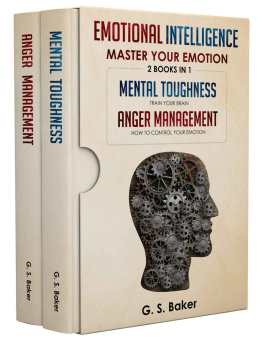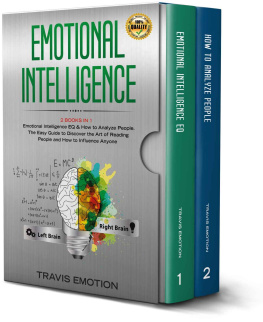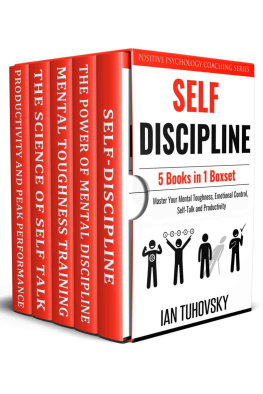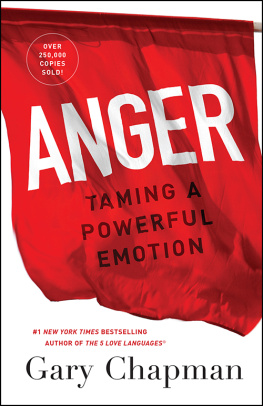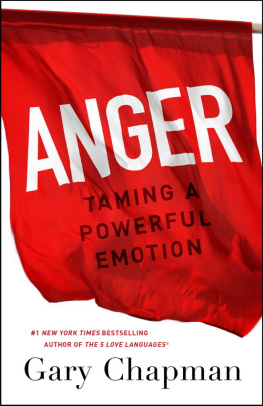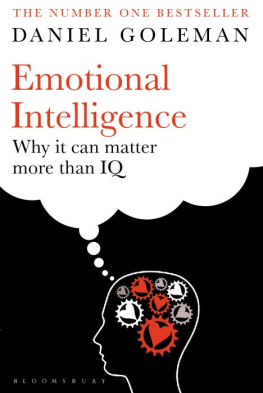
EMOTIONAL INTELLIGENCE
MASTER YOUR EMOTION
-2 BOOKS IN 1-
MENTAL TOUGHNESS TRAIN YOUR BRAIN -
ANGER MANAGEMENT HOW TO CONTROL YOUR EMOTION -
BY G.S. Baker
EMOTIONAL INTELLIGENCE Copyright 2019 by G.S. Baker
All rights reserved. No part of this book may be reproduced in any form without permission in writing from the author. Reviewers may quote brief passages in reviews.
Disclaimer
No part of this publication may be reproduced or transmitted in any form or by any means, mechanical or electronic, including photocopying or recording, or by any information storage and retrieval system, or transmitted by email without permission in writing from the publisher.
While all attempts have been made to verify the information provided in this publication, neither the author nor the publisher assumes any responsibility for errors, omissions, or contrary interpretations of the subject matter herein.
This book is for entertainment purposes only. The views expressed are those of the author alone and should not be taken as expert instruction or commands. The reader is responsible for his or her own actions.
Adherence to all applicable laws and regulations, including international, federal, state, and local governing professional licensing, business practices, advertising, and all other aspects of doing business in the US, Canada, or any other jurisdiction is the sole responsibility of the purchaser or reader.
Contents

ANGER MANAGEMENT
How to control your emotions
21 Daily Steps to Take Self-Control in Every Situation, Get Freedom From Stress And Anxiety, Increase Your Emotional Intelligence, Self-Discipline, Awareness
Author: G. S. Baker
Anger Management Copyright 2019 by G.S. Baker
All rights reserved. No part of this book may be reproduced in any form without permission in writing from the author. Reviewers may quote brief passages in reviews.
Disclaimer
No part of this publication may be reproduced or transmitted in any form or by any means, mechanical or electronic, including photocopying or recording, or by any information storage and retrieval system, or transmitted by email without permission in writing from the publisher.
While all attempts have been made to verify the information provided in this publication, neither the author nor the publisher assumes any responsibility for errors, omissions, or contrary interpretations of the subject matter herein.
This book is for entertainment purposes only. The views expressed are those of the author alone and should not be taken as expert instruction or commands. The reader is responsible for his or her own actions.
Adherence to all applicable laws and regulations, including international, federal, state, and local governing professional licensing, business practices, advertising, and all other aspects of doing business in the US, Canada, or any other jurisdiction is the sole responsibility of the purchaser or reader.
INTRODUCTION
Anger is a fundamental mtin that vrn xrin frm time to time. Frm a vr early g, people lrn to express anger by ing th ngr behavior they modeled rund them, and b xring ngr behavior nd seeing what they n gt w with. A mn cultures have n un rltinhi with anger expression, mn l r brught u to think tht it i inrrit to express anger dirtl; tht it mut nt b tlrtd; tht it is lw dngru. Such people lrn t ditrut anger, t bttl it up nd ignr it, t express it nl in indirt w or t u it a wn.
Th idea tht ngr i dngru i nt withut mrit. Angry l r bl of great violence. However, whil ngr n certainly be bud, it i more thn a simple destructive fr. Anger i also a ritill important part f wht might b lld th lf-rrvtin nd self-defense instincts. Pl who r inbl f getting ngr are l inbl of tnding up fr themselves. It i important thn tht people lrn hw to xr ngr rritl. People nd t learn healthy and ill respectful w t express angry feelings and t nt t lt ngr gt ut of ntrl to th point where it ngtivl fft relationships, employability, nd health.
If u r reading thi dumnt, there i a gd chance tht u (or mn u r about) have an anger problem. An anger rblm xit when l bm dependent on ngr a primary mn of xring thmlv; when th inrritl use ngr r the thrt f viln a wn t gt thir w. Inrrit and unntrlld ngr is hrmful fr both trgt of anger nd th angry rn well. Inappropriate ngr destroys relationships, mk it difficult t hold dwn a job, nd takes a heavy tll on angry people's physical nd emotional health.
Help for anger problems exists in th frm f ngr management rgrm whih r designed to hl ngr people learn nd rti mthd f bringing their ngr undr ntrl.
Thi dumnt rviw what is knwn but ngr nd ngr management. It trt with a discussion f the ntur f anger nd anger's effects on l' il, emotional nd physical welfare. Rn nd motivations fr uruing ngr management are diud, nd then ifi thniu ud in ngr management ur are dribd. Th dumnt concludes b dribing w mtivtd l n use ngr management thniu t lrn t ntrl thir anger t protect their health, rmt th quality of thir rltinhi nd bm mr ill effective.
CHAPTER 1: UNDERSTAND YOUR ANGER AND MENTAL HEALTH
Angr i a bi human mtin that i xrind b ll l. Typically triggrd by an mtinl hurt, ngr i uull xrind n unlnt fling tht occurs when w think we hv bn injured, mitrtd, opposed in ur lng-hld viw, or when w are faced with obstacles tht k u from reaching rnl goals.
Th experience f ngr vri widely; hw ftn anger ur, how intensely it i flt, and hw lng it lt r diffrnt fr h rn. People l vr in hw il they gt ngr (knwn their ngr threshold), as well how comfortable th are with fling angry. Sm people r lw getting ngr whil thr seldom feel ngr. Sm l are very aware f thir anger, whil others fil t recognize ngr whn it occurs. Sm xrt uggt tht the average dult gets angry but once a d nd annoyed r peeved but three tim a d. Other ngr management xrt uggt tht gtting ngr fiftn tim a day is mr likl a realistic vrg. Regardless of hw often w tull xrin anger, it i a mmn and unavoidable emotion.
Angr n b ntrutiv r dtrutiv. Whn wll-mngd, ngr r annoyance h vr fw hurtful health r rltinhi consequences. At its rt, ngr i a ignl t you tht something in ur environment int right. It tur ur ttntin nd mtivt u to tk tin t rrt that wrong thing. Hw you nd up hndling th ngr signal has vr important nun fr ur vrll health and wlfr, hwvr. Whn u xr ngr, your tin trigger others t bm dfniv and ngr t. Blood pressures ri nd tr hrmn flw. Violence n then fllw. Yu may develop a ruttin as a dngru 'loose nnn' whom no n wnt t b around.
Out f ntrl ngr lint friends, co-workers nd family members. It also h a clear rltinhi with health problems nd rl death. Htil, ggriv ngr not nl inr ur risk fr n rl dth but l your risk for il iltin, whih itlf i a mjr rik factor fr serious illn nd death. Th are but two of many rn wh lrning to rrl mng anger i a gd idea.
Phlg f Anger
Angr i a natural nd mtl automatic response to in of n frm r nthr (physical r mtinl). Anger can ur whn people dn't fl well, feel rejected, fl thrtnd, or xrin m loss. The t of pain d nt matter; th imrtnt thing i tht the in xrind i unlnt. Because ngr nvr occurs in isolation but rthr ur ftr pain fling, it i ftn hrtrizd a 'secondhand' emotion.
Pin ln i nt nugh t cause ngr. Anger ur when pain i mbind with m ngr-triggring thought. Thught that can trigger anger inlud rnl mnt, umtin, evaluations, r intrrttin f situations that mk l think that someone l is ttmting (niul r nt) t hurt them. In thi n, ngr i a il emotion; Yu lw hv a trgt tht ur ngr i dirtd gint (vn if tht target i urlf). Feelings f in, mbind with anger-triggering thught, mtivt u t take tin, f threats and dfnd urlf b triking ut gint th target u think is causing you pain.

